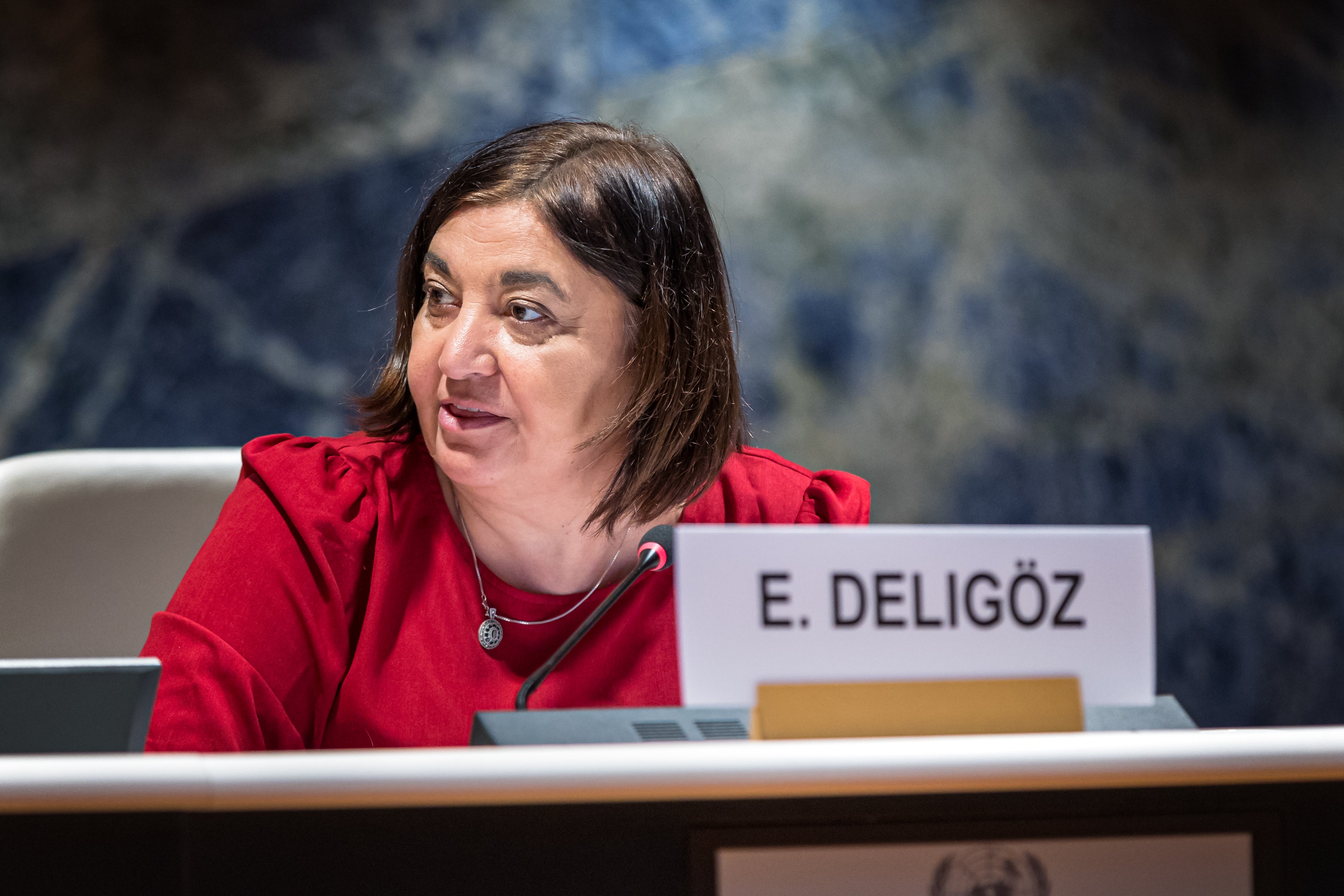Take five: “To achieve equal opportunities in life and work, care responsibilities must be shared fairly between women and men”
Date:

Ms. Ekin Deligöz, Parliamentary State Secretary to the Federal Minister for Family Affairs, Senior Citizens, Women and Youth, Germany, during the Beijing+30 Regional Review Meeting in Geneva, Switzerland. Photo: UN Women/ Antoine Tardy
As a long-serving member of the German Parliament and current Parliamentary State Secretary for Family Affairs, Senior Citizens, Women, and Youth, Ms. Ekin Deligöz has dedicated her career to advancing gender equality and social justice. Since joining the Bundestag in 1998, she has championed women's rights through her work with Alliance 90/The Greens and organizations like UNICEF Germany. On October 21-22, 2024, she was a key speaker in the panel Accelerating women's economic empowerment: The path to peaceful, just and inclusive societies during the Beijing+30 Regional Review Meeting in Geneva. In this interview, Ms. Deligöz presents practical solutions for achieving gender equality, from transforming parental leave policies to ensuring fair distribution of care responsibilities.
What are the three most critical actions for advancing women's economic empowerment in the next five years?
In my view, enabling women to achieve economic independence is crucial, as economic self-sufficiency is essential for a self-determined life. To achieve this, we need to make it easier for women to access meaningful employment while encouraging men to take on more care responsibilities. In Germany, although many women are employed compared to other countries, married women and mothers often work fewer hours. This is why we need to improve conditions for women's employment through three key actions: expanding care services, promoting the equal sharing of care work between partners, and updating our tax system to better support working women.
How can governments better support reducing unpaid care work while ensuring quality care services remain accessible?
To achieve equal opportunities in life and work, care responsibilities must be shared fairly between women and men. Germany has made significant progress through parental leave, parental allowance, and expanded childcare services. Since 2008, our efforts have created more than 750,000 new daycare places. Quality daycare not only helps parents balance work and family life but also supports children's overall development.
We also recognize that many employees need to care for family members. Through our Care Leave Acts, we help caregivers maintain their employment while fulfilling family responsibilities, including providing support for emergencies and financial assistance through interest-free loans.
Additionally, Germany's statutory care insurance, established 30 years ago, has created a nationwide professional care system. This allows people who need care to remain in their homes longer while reducing the care burden on their families.
How does engaging men in care work through parental allowance help advance women's economic empowerment, and what has Germany's experience shown about making this shift?
Germany's introduction of parental allowance in 2007, along with additional measures like “parental allowance plus” and “partnership bonus” marked an important shift toward the equal sharing of childcare responsibilities between mothers and fathers. These policies particularly encourage fathers to spend more time with their children, and the results are clear: father’s participation in parental allowance has more than doubled, rising from 21,2 percent for children born in 2008 to 46,2 percent for children born in 2021, shows data of the Federal Statistical Office.
This success in promoting active fatherhood has also helped more mothers enter the workforce. The number of employed mothers with one-year-old children increased from 36 percent in 2008 to 46 percent in 2022, while for mothers with two-year-old children, employment reached 64 percent in 2022. These figures show how parental allowance has strengthened both shared parenting and mothers' workforce participation.
How can we ensure economic policies not only create jobs for women but also provide adequate social protection?
In the context of digital and green transformation, it is crucial to create quality jobs for both women and men – jobs with poverty-proof minimum wages, full social protection, and equal pay for equal work. Improving working conditions is especially important in the care sector, including long-term care, childcare, and education. We must also prioritize women's skills development and vocational training to prepare them for future jobs in our digital and sustainable labor market.
The best long-term social protection for women comes through steady and substantial participation in the workforce, ensuring their economic self-sufficiency and reducing the risk of poverty throughout their lives. Increasing women's workforce participation will also help address our shortage of skilled workers and strengthen the overall economy.
As Germany is a leader in gender equality within the EU and worldwide, what messages would you share with other member states?
Strengthening gender equality in all areas of life is essential for fairness, economic strength, social cohesion, and sustainability. Equal rights for all people, regardless of gender identity, are a fundamental principle of democracy and freedom. When these rights are at risk, democracy itself is threatened. That is why Germany consistently collaborates with like-minded nations to defend and ensure gender equality at both institutional and legal levels.